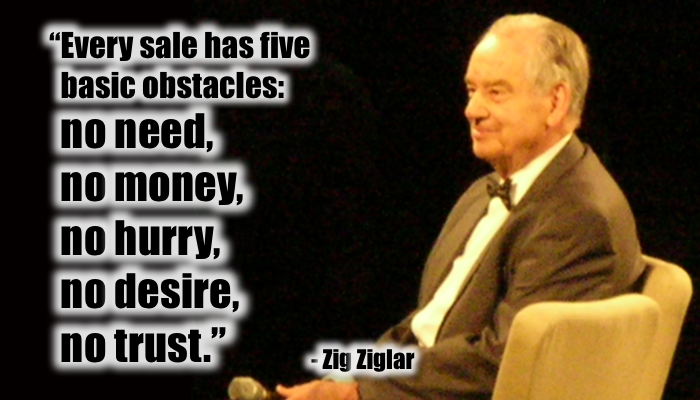Types of Sales Objections
- Home
- Sales Objections
- Types on Objections
Sales objections come in different forms, there are various sales resistance types and not all of them are real objections.
I'm talking about conditions and stalls, as distinct from true objections.
Let’s look at them in turn.
Sales objections are a natural part of the sales process.
Whether it’s about price, timing, trust, or value — they come up in almost every conversation.
👉 Serious about overcoming objections and closing more deals?
Click here to get the 3-part Sales Objection Mastery course — now discounted until March 31st.
Conditions
A Condition is:
A valid and legitimate reasons for not going ahead with a sale, a reality condition that prevents the person from buying: can't afford it, doesn't need it, etc.
Examples:
“We don’t have budget approval this quarter; all discretionary spending is on hold company-wide.”
Why it's a condition: No amount of persuasion can unlock a frozen budget until internal policies change.
“We’re locked into a 2-year contract with another provider — early termination would be too costly.”
Why it's a condition: Binding legal or contractual obligations prevent switching until the contract expires.
“Your system doesn’t integrate with our legacy platform, and we’re not scheduled to upgrade for another year.”
Why it's a condition: Technical limitations make the purchase unworkable at this time.
“The CEO makes these decisions and is on sabbatical for three months.”
Why it's a condition: You can't proceed until the decision-maker is available.
These are conditions.
You can recognise a true condition by asking:
“Is this a real, immovable barrier... or a smokescreen for a deeper objection?”
If it’s the former, the sale may be deferred, not lost.
The key is for you to ask questions that determine the nature of the condition, and then schedule the appointment for a time when the condition requirements have been met.
You simply need to identify true conditions, face the reality, swallow hard and both quickly and courteously disconnect from trying to force a sale. If you become too emotionally involved you will lose your objectivity to detect this. By becoming an expert qualifier, you don't dampen your enthusiasm by trying to overcome a condition that can't be overcome.
So, to maintain your objectivity you need to maintain the right attitude.
If you need help with your attitude when handling all types of objections ...
What's the mental approach to handling customer objections
The real secret to handling conditions is to find out about them as soon as you can. It's better to discover that Dad wants to approve the house before you put the buyers in the car. That way, Dad can come along and see that the house they choose is really the best one.
The benefit of handling a condition up front is that you don't waste time overcoming sales objections that do not exist and selling to people who aren't in a position—or don't have the authority—to make the decision.
Stalls

You'll recognise the most common form of a stall with these words:
"We want to think it over."
Or
“I’m too busy to make a decision right now.”
Or
"I need to Speak To ..."
There are many variations.
The key to dealing with these objections is to recognise the customer's statement is a stall, so you know what to say.
This is perhaps the most common objection. It stands to reason, then, that the strategies you use for countering Stalls are going to be a major factor in your success as a salesperson.
Whatever the cause for the stall, handling it isn't a science, it's an art.
The art is in helping the customer see that you truly accept and understand their hesitation.
Acknowledge that you heard them. Ask questions, start a conversation, draw them out.
“I understand why you might want to think it over since it is a big commitment.”
Probe. Ask questions that might reveal what is really stopping them.
For example,
"Are you concerned with the terms?"
"Maybe there is something that I was not clear about when I described what the job would entail."
"Maybe I can help by answering the question now."
"What was it about my estimate that you wanted to think over?”"
Your goal is to determine the underlying objection.
Often, you'll get a reply that helps you uncover the real objection so that you can handle it.
It's very important to isolate the real objection
It is always easier answering the question now rather than later because usually there is no later. This type of approach should enable you to start up the conversation again and help make the prospect feel more comfortable about giving you an affirmative answer now.
When you listen beyond the prospect's words, you'll often realise they are trying to camouflage their real concern. Perhaps a buyer or seller is afraid that if they tell you the real reason they don't feel they should make a decision, you'll handle it. Or maybe they are trying to avoid confrontation. By telling you the truth, they take a risk. It's much easier than saying, "We're not sure we trust you."
A couple of special types of the Stall are:
The Doubter's Manoeuvre, when your prospect won't (or can't) decide the questions you put to them--and is unwilling to suggest someone else who can. It's a toughie, because a variety of factors can lie beneath this objection, from low self-esteem on the part of your prospect, to bad organisation within the company. (What if you're dealing with a small business that really has no "purchasing agent" or "office manager"?) and let's face it, overstepping one's authority is not a key to success in business. If you're speaking with someone who traditionally has never made a decision, it will be very difficult to convince him to adopt an aggressive approach to his business problems.
The Reassurance Request, where the prospect asks for a sign of credibility from your side. It's still an objection, but it requires that you listen carefully to what the prospect is really saying, so that you can offer him the information he needs to proceed with confidence.
Testimonial
The info is very helpful and productive... Gurbir Singh
Want to see how top B2B salespeople handle true objections?
Click here to master sales objections with this 3-course system.
True Objections
According to my first sales manager there Are Only About Six Real Objections:
You'll notice in the image on the right Zig Ziglar only mentions 5 sales objections.
Also, the website Changing Minds has a different set of real objections
Whatever objection you get there are things you should not do when answering objections.
1) "I don't have enough time,"
This objection can be turned around on itself.
Often you can say that your product or system will save them time.
2) "I don't have enough money,"
This is best handled by using the Contrast frame and re-establishing Value.
There are things you should absolutely do when dealing with sales objections.

3)"It won't work for me (it works for everyone else but it won't work for me),"
4)"I don't believe you."
Remember people buy from those they Know, Like and Trust.
This is the Trust part of that equation.
There are ways to build Trust
And lets's face it some prospects and customers are just very skeptical.
And there are ways of dealing with skeptical prospects.
5)“I have no need for your product”
These objections can best be handled by bringing on your witnesses.
It may be that you have misread the customer need in your profiling or qualification.
It's just as likely you have not established your value well.
Linguistically you can use the “feel-felt-found” approach.
This approach is useful in many situations but maybe not one to use with an experienced buyer
You know, ...“ I can understand that you feel that way. Jim Smith felt that way too and let me tell you what he found…”
If the client doesn’t believe you it could also be a good idea to concentrate on rebuilding rapport.
6) “I have no need for your product at the moment”= No urgency
The client does see some utility in your offer but has other more pressing priorities.
In this instance you may need to go back and build the value of your offer while accentuating the negative side of not acting now.
it can also help to use a little bit of Scarcity (see Influence Summary 2nd last heading)
Of course, there are many sales objections and you may not agree with classifying them all this way.
Here is a list of Common Sales Objections
If you want to go beyond theory and master objections in the real world, check out this complete trilogy of video courses on mastering sales objections. It gives you the mindset, tactics, and system to turn objections into closed deals.
No matter what objection you get ...
If you want to get better at handling sales objections you can start
with one of these courses
You might like these
Return to the Sales Objections Menu Page
- Home
- Sales Objections
- Types on Objections